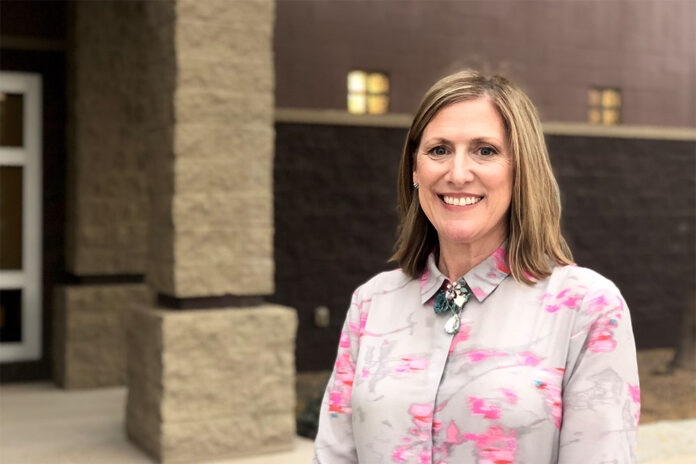
Tracey Lopeman officially becomes the superintendent of Maricopa Unified School District July 1. Lopeman is currently under contract as a consultant and de facto interim superintendent after the early departure of Steve Chestnut. She spoke with InMaricopa’s Michelle Chance about the future of the district.[quote_box_right]TRACEY LOPEMAN
Hometown: Henderson, Nevada
Residence: Phoenix
Plans to move to Maricopa: Not right now
Commute: I enjoy it. It’s a nice drive, and it allows me some time to think about work and get ready for the day.
Family: I have a fiancée, Tony Johnson. The rest of my family still lives in Henderson. I have a brother and sister and my nephews.
Pets: Two rescue dogs, Chico and Howard.
Education: I went to Northern Arizona University for my bachelor’s degree and I got my master’s and my doctorate at Arizona State University.
Hobbies: We go to ASU football games. I enjoy sports, cooking, home design, yard work, time with family and friends and entertaining.
Little known fact: I’m an excellent tap dancer. I’ve been doing it since I was 5.[/quote_box_right]
What are some tangible goals you have for MUSD?
Some tangible goals have to do with student achievement: Improving the numbers of students who are proficient and highly proficient on the Az Merit. Teacher retention and, of course, that’s directly related to student achievement. We can track teacher retention. I also have a goal for safety and service. Things that we can associate with safety and service would be transportation services and behavior management on the campuses and making sure the environment is orderly and calm and we can track those as well.
What are some challenges at MUSD you hope to overcome?
One of the challenges is the teacher turnover. We want to make sure that we are not having to start over every year with high numbers of staff. So, if we can impact teacher retention, we are going to do that.
What are your specific strategies to keep teachers?
We want to get as much of that money (from new state budget) into the classroom as possible. We think we have a really good approach to that, a really good plan. It’s not approved by our board yet, but I think that it will be well received by our staff. We want to have a competitive package, and we believe the increase that we’ve received from the Legislature is going to help with that.
How do you define a teacher?
Obviously, there [are] three separate definitions the Legislature has included. For our purposes, we want to use the most broad definition as possible so that we can make sure as many teachers as possible have their raise.
Will that definition be shared in a future board meeting?
Absolutely it will. This is all a part of the package that we are continuing to craft and I’d love to give you the scoop, but I’ve got four board members that don’t know the details yet because we are really still crafting them.
With the new budget, there’s an increase to the base formula that calculates teacher pay. Can you share how that would apply to MUSD’s “unique student characteristics” you mentioned at a previous board meeting?
Those are the different weights that are applied to students when it comes to our enrollment. Whether it’s a typical student or a special needs student, there’s a formula that is influenced by those characteristics.
And every district is going to have to figure out what those are individually?
Yes, and we will share those at a future meeting.
Are there any plans in the budget to boost classified employee pay?
Yes. We believe that every employee impacts students. Every one of us is here to serve students in one form or another, and we also know that we want to be competitive across all employee groups. We want to make sure that we validate what every employee brings to the education of every MUSD student. We believe that reflects the intent of the #RedForEd movement. It was to support all employee groups – certified and classified. https://www.inmaricopa.com/musd-approves-10-teacher-raise/
The #RedForEd movement began soon after you were hired. How did that make you feel?
It was like, ‘Wait a minute, I just got here and everybody’s leaving?’ I feel like we had a front-row seat to something historic in Arizona. It is a familiar message that our state needed to properly fund public education. That’s not new, but the method was completely new.
It was exciting to have a front-row seat for that. It’s unfortunate we lost six days (of school). I certainly did not want to see that happen, but we were linking arms as a leadership team. I think districts across the state linked arms to figure out how we could best respond to this unprecedented movement. It was an awesome learning experience that I couldn’t have ever have imagined.
What are your duties at your current post at Alhambra Elementary School District?
I am an assistant superintendent for strategic planning, implementation and accountability. Right now, I am at the point of closing out the strategic plan in the Alhambra School District. I’m working with departments and bringing that to closure. I’m spending about three days a week in Maricopa because I have that support from my current superintendent in Alhambra.
How did you spend your tenure at Alhambra?
I was a teacher, then an assistant principal, then a school principal for 13 years. Then I worked at the district office as an assistant superintendent on the strategic plan. It’s hard to believe that was 28 years.
What do you bring to the table that’s different from what MUSD has had, this being your first post as superintendent?
I think I bring a knowledge base and an experience base that will capitalize on what (former Superintendent Steve) Chestnut brought with the vision and strategic plan that he established here. There’s a great foundation for strategic thinking and accountability already. So, I think I bring that mindset to the organization and, also, I bring an external focus that will assist with the marketing of our district. I have my experience through my roles at district office in that, so I can bring those connections and relationships to this district.
I have experience that picks up the torch without much delay and builds on the foundation that (Chestnut) established here. I’m really quite lucky because there’ so many great things going on in every one of the schools and there [are] already some pretty powerful relationships with different communities in and out of town, so I’m ready to, without missing a beat, continue what we have established.
A lot of teachers have complained about poor communication between school sites and the district office and have expressed a desire to see their superintendent present on campuses. What’s your philosophy?
One of the experiences that I’ve had as the assistant superintendent was facilitating the superintendent’s advisory councils for the last two years. I am familiar with and have seen the benefit of the experience of having a certified advisory council, a classified advisory council, a student advisory council, a parent advisory council.
Those are opportunities to interact directly with those different groups to listen and hear about concerns, but also get feedback on the direction and accomplishments related to our strategic plan. I know that I have different avenues already established to create those channels for deliberate, planned, routine feedback, conversation and relationship building.
That’s something you’d start at MUSD?
For sure. That will be happening at every site when we are back in the fall.
MUSD board members have discussed building new schools. How do you plan to accommodate this growth?
Growth is a great problem to have. We see it as an opportunity. We are going to engage the community, the staff, and we’re also going to engage the experts. We make sure the decisions we make are sustainable. Talk about an intense conversation with lots of details, that’s a very long-term conversation that will be inclusive and transparent.
A portion of this interview appears in the June issue of InMaricopa.





![Maricopa’s ‘TikTok Rizz Party,’ explained One of several flyers for a "TikTok rizz party" is taped to a door in the Maricopa Business Center along Honeycutt Road on April 23, 2024. [Monica D. Spencer]](https://www.inmaricopa.com/wp-content/uploads/2024/04/spencer-042324-tiktok-rizz-party-flyer-web-218x150.jpg)






![Alleged car thief released without charges Phoenix police stop a stolen vehicle on April 20, 2024. [Facebook]](https://www.inmaricopa.com/wp-content/uploads/2024/04/IMG_5040-218x150.jpg)




